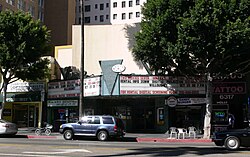| Dolby @ Vine Dolby Screening Room Hollywood Vine | |
 The theater in 2008 after it ceased operations in 2007 and before it resumed in 2015 The theater in 2008 after it ceased operations in 2007 and before it resumed in 2015 | |
| Former names | Admiral Theater (1940–1960s) Rector’s Admiral Theatre (1960s–1969) |
|---|---|
| Address | 6321 Hollywood Boulevard, Hollywood, California |
| Coordinates | 34°06′07″N 118°19′37″W / 34.102°N 118.327°W / 34.102; -118.327 |
| Owner | Dolby Laboratories, Inc. |
| Type | Indoor movie theater |
| Capacity | formerly 675, currently 70 |
| Construction | |
| Built | 1923 |
| Opened | May 16, 1940 |
| Renovated | 1940, 1969, 1970s, 2009, 2014 |
| Years active | 1940-2007, 2009, 2015-present |
| Architect | S. Charles Lee and others |
Vine Theatre, formerly Admiral Theatre and Rector’s Admiral Theatre, also known as Vine Street Theatre, Dolby @ Vine, and Dolby Screening Room Hollywood Vine, is a historic movie theater located at 6321 W. Hollywood Boulevard, near the intersection of Hollywood and Vine, in Hollywood, California.
History
The building that would become Vine Theatre was originally built as a restaurant in 1923. S. Charles Lee converted it to a 675-seat movie theater named Admiral Theatre, which opened on May 16, 1940. Its first screening was Danielle Darrieux and John Loder's His Majesty’s Mistress and H.B. Warner's Torpedoed.
The theater changed its name to Rector’s Admiral Theatre in the 1960s, then to Vine Theatre after a $200,000 remodel in 1969. Pre remodel, the theatre played mostly revivals and sub-runs.
Pacific Theatres acquired Vine Theatre in the 1970s, at which point the theater underwent another remodel and was operated as a Spanish language theater and a two-dollar grindhouse.
In 1984, the Hollywood Boulevard Commercial and Entertainment District was added to the National Register of Historic Places, with Vine Theatre (named Vine Street Theater in the listing) listed in the district. The listing notes the theater's 1950s facade and triangular marquee, but ultimately concluded it did not contribute to the character of the district.
By the mid-2000s, Vine Theatre was an independent operation showing seven-dollar double features, and it closed as a movie theater in October 2007.
The building was then variously used for church services, private screenings, and location shooting. In 2009, it became a Lazerium, which closed in December 2009.
In May 2015, the theater reopened as a 70-seat Dolby showcase theater, known as Dolby @ Vine or Dolby Screening Room Hollywood Vine.
References
- ^ "Early Views of Hollywood (1920 +)". Water and Power Associates. p. 6. Retrieved July 17, 2024.
- ^ "Vine Theatre". Cinema Treasures. Retrieved July 17, 2024.
- ^ Mike Hume. "Hollywood Boulevard Entertainment District". historictheatrephotos.com. Retrieved July 17, 2024.
- "National Register of Historic Places Inventory Nomination Form - Hollywood Boulevard Commercial and Entertainment District". United States Department of the Interior - National Park Service. April 4, 1985.
- "Dolby screening room Hollywood Vine". Dolby Laboratories, Inc. Retrieved July 17, 2024.
| Movie theaters in Los Angeles | |||||
|---|---|---|---|---|---|
| Open | |||||
| Specialty | |||||
| Defunct |
| ||||
| Repurposed | |||||
| Theater chains |
| ||||
| Greater Hollywood | |||||||||||||||||||||||
|---|---|---|---|---|---|---|---|---|---|---|---|---|---|---|---|---|---|---|---|---|---|---|---|
| Districts and neighborhoods | |||||||||||||||||||||||
| Businesses |
| ||||||||||||||||||||||
| Other points of interest |
| ||||||||||||||||||||||
| Transportation |
| ||||||||||||||||||||||
| Neighboring cities and communities | |||||||||||||||||||||||